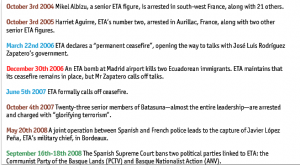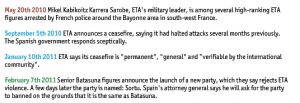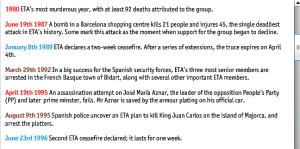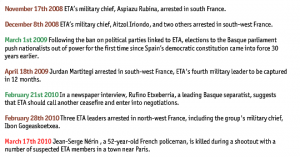Development/ Background of ETA
by: Jackie Calderon
Origins:
ETA grew from a student group called Ekin, founded in the early 1950s, which published a magazine and undertook direct action. ETA was founded on 31 July 1959 as Euskadi Ta Askatasuna (Basque Homeland and Freedom) by students frustrated by the moderate stance of the Basque Nationalist Party. (Originally, the name for the organisation used the word Aberri instead of Euskadi, creating the acronym ATA. However, in some Basque dialects, ata means duck, so the name was changed.)
ETA held their first assembly in Bayonne, France, in 1962, during which a “declaration of principles” was formulated and following which a structure of activist cells was developed. Subsequently, Marxist and third-worldist perspectives developed within ETA, becoming the basis for a political programme set out in Federico Krutwig’s 1963 book Vasconia, which is considered to be the defining text of the movement. In contrast to previous Basque nationalist platforms, Krutwig’s vision was anti-religious and based upon language and culture rather than race. ETA’s third and fourth assemblies, held in 1964 and 1965, adopted an anti-capitalist and anti-imperialist position, seeing nationalism and the class struggle as intrinsically connected.
Like other revolutionary organizations with roots in ethnic nationalism, ETA was founded by members of a nationalist organization who sought a more direct route to national liberation and believed violence is justified in its pursuit. The group was originally founded as a student discussion group in 1952 at the University of Deusto, in Bilbao. The group was founded as a Marxist-Leninist group, but is not so strictly ideological in this vein.
Historical Context, Basque Nationalism:
Basque nationalism emerged in the 19th century following the Spanish crown’s revoking of the fueros, laws that had privileged Basque autonomy in relation to the central Spanish government. Basque nationalism was further elaborated in the 20th century. The early organizers of ETA took their inspiration from other third-world or non-aligned revolutionary independence movements in the 1960s. Today, the Basque country does operate in partial autonomy.
Timeline provided by The Economist: (www.economist.com)- click on each picture to make it larger











 This is the default footer layout. You can easily add or remove columns in the footer.
This is the default footer layout. You can easily add or remove columns in the footer.
Recent Comments